Goodbyepublished at 16:29 BST 9 October 2021
That's all from us on the live page today.
Thank you for joining us for the UUP leader's speech.
Enjoy the rest of your weekend.
The Ulster Unionist Party held its first gathering for a party conference since 2018
Doug Beattie gave his first conference speech since he became party leader in May
The Upper Bann MLA called for a return to the "factory settings" of the 1998 Good Friday Agreement
Mr Beattie set out his plan to promote a more confident "pro-union message" in the run up to the next assembly election
He criticised other unionist parties over their response to the Northern Ireland Protocol
Ali Gordon and Jessica Black
That's all from us on the live page today.
Thank you for joining us for the UUP leader's speech.
Enjoy the rest of your weekend.
Well it's a big thumbs up, or rather a big round of applause, from Strangford MLA and former party leader Mike Nesbitt.
Allow X content?
This article contains content provided by X. We ask for your permission before anything is loaded, as they may be using cookies and other technologies. You may want to read X’s cookie policy, external and privacy policy, external before accepting. To view this content choose ‘accept and continue’.
Doug Beattie ends his first leader's speech by saying: "We are confident unionists, we are positive unionists, we are inclusive unionists, we are welcoming unionists.
"We are the Ulster Unionist Party and we are back."
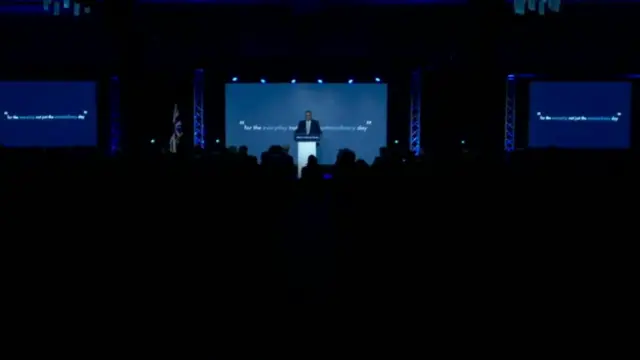 Image source, UUP
Image source, UUPThe UUP leader urges delegates to "not confuse friendship with weakness".
"Do not think by engaging that I have lost my purpose or direction," he says.
Mr Beattie vows to lead the UUP to success in May, but if the election is brought forward "to placate the narrow self-interest of some" then "so be it", he says.
"As the great Irish World War Two General Bala Bredin said, 'If we can get the soldiers to the start line, sober and pointing in the right direction we could achieve just about anything’," he says, to laughter from the audience.
How do you secure Northern Ireland's future?
Not "by wrapping yourself in a flag", Mr Beattie tells delegates.
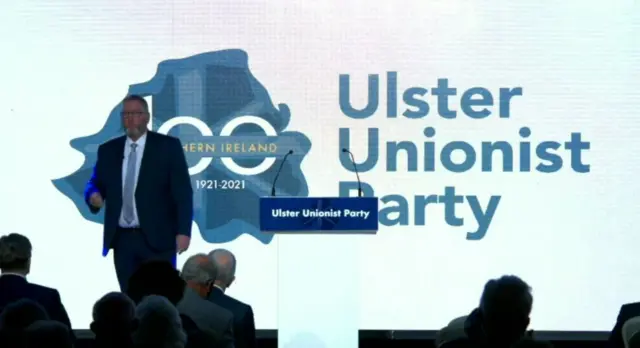 Image source, UUP
Image source, UUP"We make people want to live here," he says.
"We make sure that they want to grow up here, to marry here, to have kids, to have a health service that is fit for purpose, and grow old here.
"And if they do that, then that is how you secure Northern Ireland.
"You do not secure it by wrapping yourself in a flag.
"You secure it by protecting your people, that is what we must focus on."
The UUP supports a public inquiry into mother-and-baby homes, Mr Beattie says.
Mr Beattie tells the conference: "The harrowing treatment of woman across this island in mother-and-baby homes and Magdalene Laundries still casts a dark shadow.
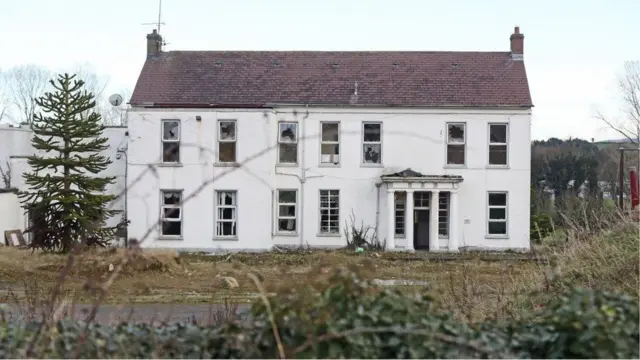 Image source, PA Media
Image source, PA Media"Those people still carry that trauma. They were treated shamefully by the institutions that should have protected them. It is up to us as political leaders to ensure that they no longer carry this burden alone.
"The Ulster Unionist Party stands with those women and supports their call for a public inquiry."
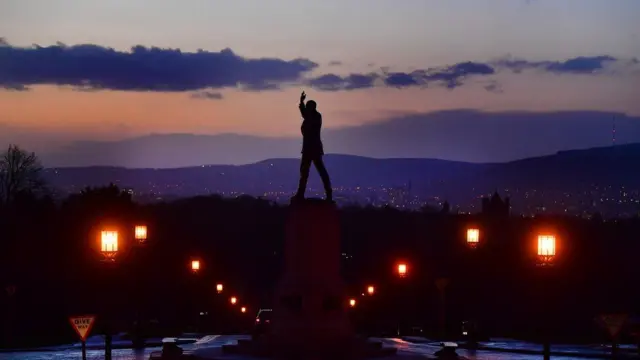 Image source, Getty Images
Image source, Getty ImagesNorthern Ireland's centenary brings up "complex feelings" but the fact of its existence and history can't be denied, Mr Beattie says.
"There have been arguments over whether it should be marked, commemorated or celebrated. But the fact is that Northern Ireland exists, it has a right to exist and it has done so for 100 years.
"I am proud to be the leader of the Ulster Unionist Party during our centenary year.
"I am proud of the people of Northern Ireland and all that we have achieved."
He adds: "Did we get it all right in the past? No we didn’t.
"Will be get it all right in the future? I doubt we will.
"But we must move forward learning the lessons of the past and vowing to do better by one another."
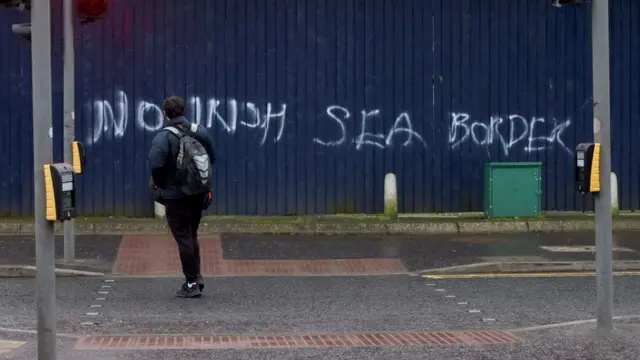 Image source, Pacemaker
Image source, PacemakerMr Beattie says he makes "no apologies" for not supporting a protocol which "damages the Belfast Agreement".
He says the protocol "must be replaced with a treaty that works for all the people of this island", and there "cannot be a border in the Irish Sea".
"As a senior EU official said to me recently the protocol doesn’t damage the Belfast Agreement as much as Brexit but they accepted it does damage it."
He adds: "The protocol has a built-in instability that will raise tensions every time we have an election as articles 5-10 are voted on every four years."
Mr Beattie says his party will not make election pacts, but instead will "stand on its own two feet".
He says more candidates will be announced in the coming weeks and months to challenge in every constituency.
"There will be no pacts, there will be no standing aside, we will stand on our own two feet and promote our vison for a better Northern Ireland.
"Let me be clear, I am not targeting any demographic, I am promoting a vison for all the people of Northern Ireland and inviting them all to vote Ulster Unionist."
He adds: "If other parties want voters transfers then they need to work for them. It's not my job to make the case for others, I do not own these votes."
The assembly must agree there is a climate emergency and set targets to combat it, Mr Beattie says.
Earlier this week, Agriculture Minister Edwin Poots warned Northern Ireland's first climate bill would "devastate" the rural economy.
Today, Mr Beattie tells his party conference "we need to get on with it".
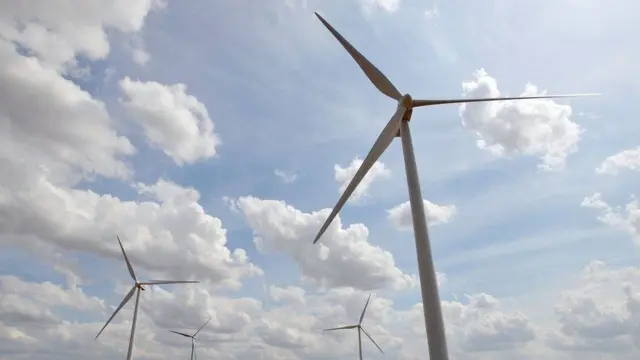 Image source, PA Media
Image source, PA MediaHe says: "The first thing we must do is ensure we all agree that there is a climate emergency, because there is. We are a tiny part of the UK, but as part of the world’s fifth largest economy we must play our part.
"We can argue targets in 2030, 2040, 2050 but the reality is if we don’t start now by passing a climate bill at the assembly and setting the conditions and direction of travel in the first five years we will hit no targets."
Mr Beattie pledges to put people first, with a welfare system which offers a "safety net not a cliff edge".
"That means focusing on good quality jobs, so our people can wake up with a sense of purpose and go to be with a sense of fulfilment," he says.
"It means focusing on our NHS, so we have a society that is healthier and a health service that is not only free at the point of delivery, but that delivery is provided as quickly as possible.
"It means focusing on infrastructure to allow a level of connectivity which will make our workforce more agile, less stressed, and more productive.
"We want an education system that creates the skills that feeds into our economy and stops our young people heading to other parts of the world for opportunities, we should be providing for them here."
He adds that the housing stock must match the demand in Northern Ireland.
Northern Ireland has left the European Union but Doug Beattie insists that people here are still Europeans and "need friends in Europe as never before".
He says his party "long warned about the harm" of the Northern Ireland Protocol and Brexit, adding "these warnings were ignored".
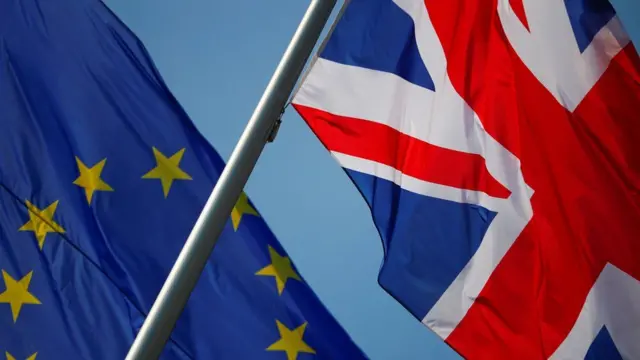 Image source, Reuters
Image source, ReutersThe protocol avoids a hard border on the island of Ireland by keeping Northern Ireland in the EU's single market for goods.
But unionists argue it creates a trade border between Great Britain and Northern Ireland.
They say it undermines Northern Ireland's constitutional position as part of the UK.
Mr Beattie says there has been "selective amnesia" about what brought the protocol about, and that his party is "continually being asked to fix mistakes made by others but we are up to the task of doing just that".
But, he adds: "The Ulster Unionist party cannot be held to account for the champagne receptions and backroom deals done by others who had influence at the time of the negotiations."
Doug Beattie outlines his plan to share his vision of unionism by sending a mission to the US, led by Mike Nesbitt.
He says the mission "will engage key influencers to create social, cultural and political understanding and friendships".
"We must make friends in other countries in order to promote our vison of unionism and move away from the negative viewpoint many have off it."
Unionism has for too long been seen as "negative, backward and angry", says Doug Beattie.
But it is home to some of the most "socially liberal" in Northern Ireland, he adds.
"I am ambitious, not personally and not just for the Ulster Unionist party, but for wider unionism. For far too long it has been viewed as negative, backward and angry.
"Yet some of the most socially liberal within Northern Ireland are found within unionism and loyalism."
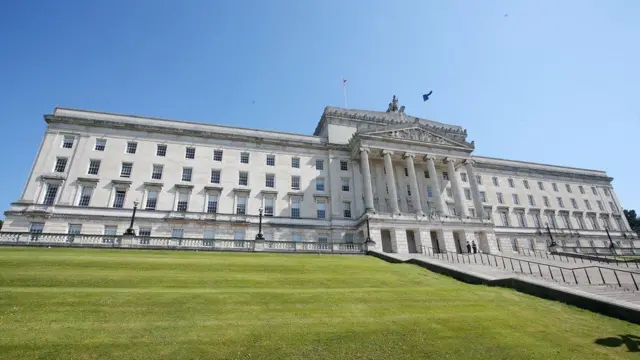
The Stormont Assembly is made up of a five-party mandatory coalition
Doug Beattie is now calling for an end to mandatory coalition, which he says has delivered "some pitiful outcomes and mutual veto".
He says the Belfast Agreement was a "fresh start" but "23 years later, it is long overdue an MOT".
The Good Friday Agreement, or the Belfast Agreement, was a peace deal signed in 1998 that helped end decades of violence in Northern Ireland.
It contained special voting mechanisms to ensure equal representation for both unionist and nationalist communities, known as mandatory coalition.
But Mr Beattie criticises the current set up, saying: "Stormont has become dysfunctional and people are angry.
"Mandatory coalition and other measures that were supposed to be about minority protection have been used and abused for the purpose of frustrating the executive and the assembly.
"A mandatory five-party coalition no longer delivers good government.
"We need to create a working power-sharing government with a working power-sharing opposition to hold them to account. This will put the electorate in the driving seat and allow them to vote out those not up to the role and vote in those with a better vison for the future."
Mr Beattie says he is confident to call himself both British and Irish but accepts "many more see themselves as Northern Irish".
"My unique identity feels at home whether I am in the Welsh valleys, the Scottish Highlands, English dales or the towns and villages of Northern Ireland," he says.
"My unionism does not follow the narrow agenda of some unionist political parties.
"My unionism is rooted in the whole of the United Kingdom and can be found in London, Edinburgh, Cardiff and of course Belfast."
Doug Beattie wants "a working power-sharing government with a working power-sharing opposition to hold them to account".
"And let us end the nonsense that the first minister is somehow different to the deputy first minister," he says.
"One cannot even send a letter without the other signing it too.
"The performance by the DUP and Sinn Féin every election when they have governed jointly and equally since 2007 is another reason why we need to return the Belfast Agreement to its factory settings."
Moving onto the issue of a border poll, Mr Beattie says a united Ireland is a "fair aspiration".
"Those who are peacefully campaigning for a united Ireland, this is a fair aspiration and we should not fear those with different political aspirations to us," he says.
"But it is not my aspiration or vision.
"My aspiration is for Northern Ireland to remain part of the United Kingdom through the good times and the hard times."
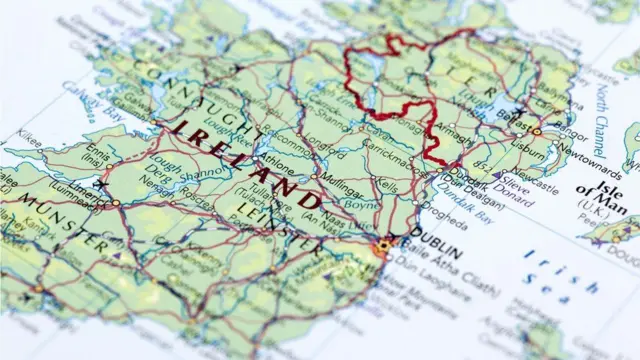 Image source, Getty Images
Image source, Getty ImagesSo what does the UUP leader describe his vision of unionism as?
"Confident, positive, progressive, and inclusive."
Doug Beattie is talking about his time in the military now.
He joined the Royal Irish Rangers at 16.
He was soon posted to Berlin, where he guarded Adolf Hitler's former deputy Rudolph Hess in Spandau Prison.
"The only privilege I have ever had was the privilege to serve with some of the finest men and women this country has ever produced," he says.
Mr Beattie remains a captain in the Army Reserves.
He now moves on to saying that he believes in a Northern Ireland "not constrained by narrow self-interest".
"I believe people are our best and most precious asset and therefore, as a political party, we must be people focused," he says.
"The hashtag Union of People is not just a strap line, it is a vision.
"It is a vison of people working together regardless of their religion, gender, colour, sexual orientation, background, or culture.
"It is a vision to make Northern Ireland work for those who live here, work here, or visit here."
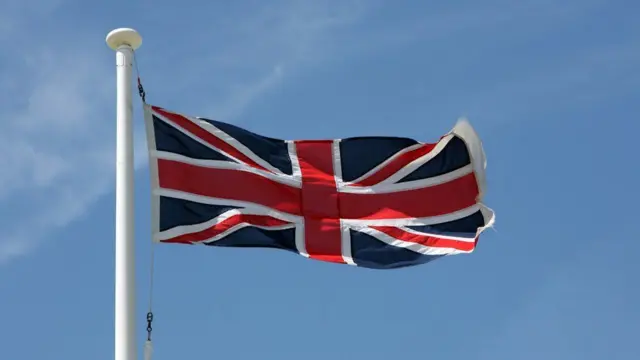
Doug Beattie tells the conference that "any notion that I come from big house unionism is a fallacy".
"Indeed the Ulster Unionists of 2021 are far removed from that old stereotype," he says.
"We come from all corners of our society, from working-class loyalist estates, to small and medium sized farms, to educational and health professionals and all that falls in-between."